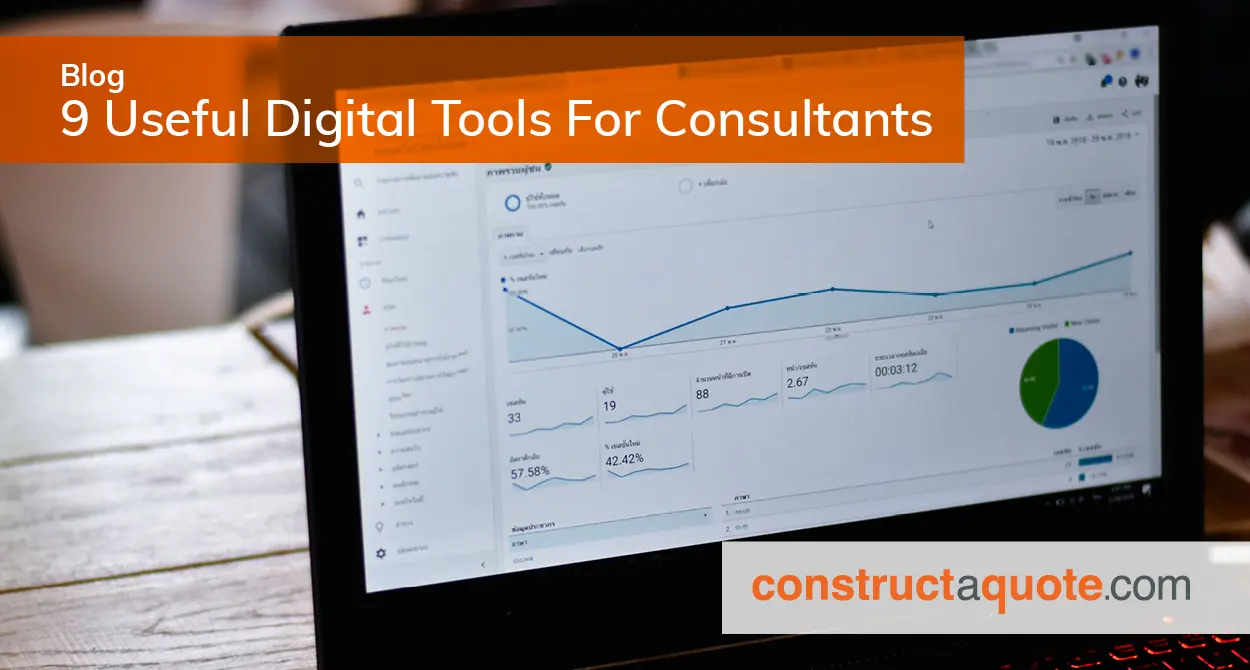by constructaquote - 13 August 2019


When you stepped into the world of consultancy, you’ll have learned very quickly that time is money. Hopefully, you’re financially rewarded for the lack of income security you forfeited when you left full-time employment, but you’ll want to cram as much work as you can into the time that you have and make your clients happy. Happy clients mean repeat business. The less time you have to spend on social media and marketing the better, right?
To help you, we’ve pulled together a list of the best social media and marketing tools for consultants. To make them even more appealing, they all have a free version.
Canva is a free online design tool, and it’s perfect for creating Facebook, Twitter, Instagram and LinkedIn posts. There are loads of handy templates, or you can start from scratch and create your own. You can even make infographics for your reports or other marketing materials like posters, brochures or portfolios.
2. Unsplash
Unsplash is a consultant’s dream. It is a completely free library of professional photographs that you can use for anything without having to give credit. Need business cards or social media images? Unsplash is the website for you.
3. Hootsuite
HootSuite has some amazing features as part of its free package. You can schedule social media posts to go out automatically, set up HootSuite to notify you every time someone communicates with you and highlight and follow other accounts. You can also ask it to keep an eye out for specific search terms cropping up across social media platforms. HootSuite allows you to upload all of your social media profiles into one dashboard and crosspost, which gets rid of the laborious task of logging in and out of different social media accounts. If you market yourself on social media, HootSuite will most certainly save you lots of time.
4. MailChimp
Never underestimate the importance of keeping people informed about what you’re up to. Monthly emails might not be relevant for all consultants, but for those who do collect email addresses for communication, MailChimp is an excellent tool for sending out updates. You can send 12,000 emails a month to 20,000 email addresses without having to pay a penny.
If you have a website, then it should be linked to Google Analytics. This essential free tool allows you to monitor where your website visitors had come from, which pages they visited, when they left and how long they stuck around for. You should be using this data to inform the direction of your online content and to market yourself in the future.
6. Facebook Page Performance Barometer
The Facebook Page Performance Barometer compares your Facebook page to the pages of your competition. It will tell you if they’re outperforming you. This way you’ll know where you stand relative to the rest of your industry. You’ll also know where you should be focusing your time and energy.
7. LinkedIn
We know what you’re thinking – LinkedIn is just a social media platform, right? Wrong. If you use LinkedIn correctly, you’ll be able to effectively market yourself and the services you offer to everyone who is in your network. There are some great articles online about how to sell yourself to your network, but basically, it’s all about common sense. Make sure you have a complete profile, connect with lots of relevant people, post relevant content to your newsfeed and comment on the posts of other people.
8. Tagboard
Hashtags are so important. Getting your content in front of the right people can seem virtually impossible across social media without investing in advertising, but hashtags are a great way to put your content in the right place. If you tell Tagboard which hashtags you’re thinking of using, it will show you the pages and profiles it appears on, so you’ll be able to gauge the popularity of each one.
Another nifty little tool from Google. Google Alerts will let you know every time your brand name is written on the internet so that you never miss a mention. Positive mentions of your brand or business are a great opportunity to promote yourself, so you’ll want to make sure that you don’t miss any of them.
You can also ask Google Alerts to tell you if your competitor is mentioned, or if there is content around the industry you work in, so you’ll always be up-to-date with what’s going on.
Now check out our 8 Apps And Software Platforms For Startups and SME’s here…

by Charlotte Houghton - 7 October 2020
by constructaquote - 6 October 2020
by Charlotte Houghton - 29 September 2020
by Charlotte Houghton - 24 September 2020